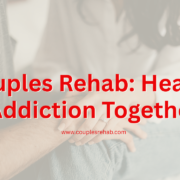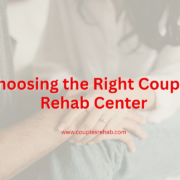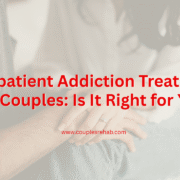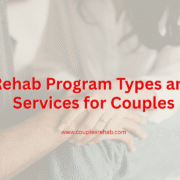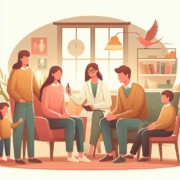Successfully completing a couples rehab program is a significant achievement, and Couples Rehab in Orange County is proud to support couples on their journey toward lasting recovery. However, the real work begins once the program ends. Maintaining the connection and skills learned during rehab is essential for long-term success in sobriety and your relationship. In this article, we’ll explore actionable strategies to help couples stay connected after completing a rehab program. These strategies focus on fostering communication, building a supportive environment, and embracing a shared commitment to growth.
Celebrate Your Success Together
Finishing a couples rehab program is no small feat. Take time to acknowledge and celebrate this milestone. Couples Rehab in Orange County emphasizes the importance of recognizing progress, which can motivate you to continue building a healthy, supportive relationship.
Plan a post-rehab celebration: Choose an activity that aligns with your new sober lifestyle, such as a hike in one of Orange County’s stunning parks or a romantic dinner at a local restaurant. Celebrating together reinforces the bond you’ve cultivated during rehab.
Reflect on your journey: Share your experiences and the growth you’ve observed in each other since starting rehab. This practice fosters gratitude and strengthens your bond, encouraging deeper emotional intimacy.
Document milestones: Create a scrapbook, write a journal, or even start a shared photo album to capture the progress and moments that define your recovery journey. Reflecting on these memories can serve as a source of inspiration and motivation.
Maintain Open and Honest Communication
Communication is the cornerstone of any successful relationship, particularly after rehab. Couples Rehab in Orange County teaches couples the importance of transparency and active listening, skills that must continue to be practiced daily.
Schedule regular check-ins: Set aside time each week to discuss your feelings, challenges, and progress. This ensures both partners feel heard and supported while reducing misunderstandings that could strain your relationship.
Use “I” statements: Express your feelings without assigning blame. For example, say, “I feel anxious when we don’t stick to our agreed-upon routine,” instead of “You never follow the schedule.” This approach encourages productive conversations.
Engage in active listening: Make an effort to truly hear your partner’s concerns and validate their feelings. Techniques like repeating back what you’ve heard or asking clarifying questions can enhance understanding and reduce conflict.
Stick to Your Aftercare Plan
An aftercare plan is crucial for sustained recovery. Couples Rehab in Orange County provides customized aftercare plans to help couples navigate life post-rehab successfully.
Attend therapy sessions: Regular couples or individual therapy sessions can address emerging issues and reinforce the skills learned during rehab. Therapists can also offer guidance for navigating new challenges in sobriety.
Join support groups: Engaging in local support groups, such as those in Orange County, can help you stay accountable and connect with others facing similar challenges. Shared experiences can provide encouragement and reduce feelings of isolation.
Follow relapse prevention strategies: Practice the coping mechanisms and techniques learned during rehab to avoid triggers and maintain sobriety. Create a list of your common triggers and actionable strategies to address them.
Stay accountable: Partner accountability is essential. Share your recovery milestones with each other and provide gentle reminders about commitments to your aftercare plan.
Build a Sober Social Network
Surrounding yourselves with a supportive community is essential for staying connected and maintaining sobriety. Couples Rehab in Orange County encourages clients to cultivate a sober social network.
Connect with like-minded couples: Attend events or activities designed for sober individuals and couples, such as sober retreats or local meetups. These gatherings provide opportunities to form meaningful connections.
Host sober gatherings: Invite friends and family to participate in sober activities, such as game nights, beach outings, or potluck dinners. These occasions foster a sense of normalcy in sobriety.
Set boundaries with old friends: If certain relationships or environments threaten your sobriety, consider creating boundaries to protect your progress. Communicate these boundaries clearly and kindly to maintain relationships without compromising your recovery.
Engage in community service: Volunteering together can strengthen your bond while fostering connections with others who share your values.
Prioritize Quality Time Together
Rehab often brings couples closer, but maintaining that closeness requires intentional effort. Couples Rehab in Orange County stresses the importance of spending quality time together.
Schedule date nights: Regular date nights can help you reconnect and strengthen your bond. Choose activities that promote communication and fun, such as cooking classes, outdoor adventures, or creative projects.
Practice mindfulness together: Engage in activities like yoga, meditation, or mindful walks to stay present and connected. These practices can also reduce stress and improve emotional regulation.
Explore hobbies: Discovering new interests together can foster teamwork and deepen your connection. Consider trying activities such as painting, gardening, or learning a new sport.
Establish rituals: Create daily or weekly rituals, like morning coffee chats or Sunday meal preps, to nurture consistency and connection in your relationship.
Address Challenges as a Team
Challenges are inevitable, but facing them together can make your relationship stronger. Couples Rehab in Orange County equips couples with conflict-resolution skills to navigate difficulties constructively.
Identify stressors: Recognize potential sources of conflict, such as financial strain, work stress, or family dynamics. Early identification allows for proactive solutions.
Use healthy coping strategies: Instead of resorting to old habits, practice the healthy coping techniques learned in rehab, such as deep breathing or journaling. These methods can defuse tension and prevent arguments.
Seek professional help: If challenges become overwhelming, don’t hesitate to reach out to a therapist or counselor for guidance. Professional support can provide perspective and tools to resolve conflicts effectively.
Adopt a problem-solving mindset: Approach issues as a team by brainstorming solutions together. This collaborative approach strengthens your partnership.

Embrace a Healthy Lifestyle
Adopting a healthy lifestyle can reinforce the lessons learned during rehab and improve your overall well-being. Couples Rehab in Orange County emphasizes the role of physical and mental health in maintaining sobriety and a strong relationship.
Exercise regularly: Physical activity reduces stress, boosts mood, and promotes a healthier lifestyle. Consider activities you can do together, such as cycling, hiking, or swimming. These activities double as quality time.
Eat nutritious meals: Preparing healthy meals together can be a fun and rewarding way to support each other’s well-being. Experiment with recipes that align with your shared goals.
Prioritize sleep: Ensure you both get adequate rest to maintain energy and focus on your recovery journey. Develop bedtime routines that promote relaxation and restorative sleep.
Practice self-care: Encourage each other to dedicate time to personal self-care activities. Whether it’s reading, meditating, or pursuing a hobby, self-care supports individual and relational well-being.
Practice Gratitude Daily
Gratitude is a powerful tool for fostering positivity and connection in your relationship. Couples Rehab in Orange County encourages couples to incorporate gratitude practices into their daily lives.
Keep a gratitude journal: Write down three things you’re grateful for each day and share them with your partner. Reflecting on positive aspects of life reinforces a hopeful outlook.
Express appreciation: Make a habit of acknowledging and thanking your partner for their efforts, no matter how small. Verbal affirmations strengthen emotional bonds.
Celebrate small victories: Recognize and celebrate even the minor achievements in your recovery and relationship. These moments build momentum for continued progress.
Create a gratitude ritual: End each day by sharing one thing you’re grateful for about each other. This simple practice can deepen your connection and set a positive tone.
Revisit and Revise Goals
Goal setting is an integral part of the recovery process. Couples Rehab in Orange County helps clients set achievable goals during their program, but these goals should evolve over time.
Review your progress: Periodically assess your individual and shared goals to ensure you’re on track. Reflect on what’s working and what might need adjustment.
Set new objectives: As you grow and achieve milestones, create new goals that challenge and inspire you. Align these objectives with your evolving values and priorities.
Celebrate achievements: Acknowledge your successes and use them as motivation to keep moving forward. Take time to honor the effort that went into reaching your goals.
Visualize your future: Regularly discuss your vision for the future as a couple. Shared aspirations can create a sense of purpose and alignment.
Stay Committed to Growth
Recovery is a lifelong journey that requires ongoing effort and commitment. Couples Rehab in Orange County empowers couples to view challenges as opportunities for growth.
Learn together: Attend workshops, seminars, or classes to continue expanding your knowledge and skills. Shared learning experiences can deepen your connection.
Support each other’s growth: Encourage your partner’s personal development by celebrating their achievements and providing constructive feedback. Champion each other’s aspirations.
Stay adaptable: Life will inevitably bring changes; embrace them as a team and remain open to learning and evolving together. Flexibility is key to navigating life’s unpredictability.
Build a legacy: Use your shared recovery journey to inspire and help others. Consider mentoring other couples or contributing to recovery-focused initiatives.
Frequently Asked Questions (FAQ) About Staying Connected After Couples Rehab
1. What is couples rehab, and how does it help relationships?
Couples rehab is a specialized recovery program designed for partners seeking help for substance abuse while working on their relationship. At Couples Rehab in Orange County, the program focuses on individual and joint healing through therapy, education, and support. This approach strengthens communication, trust, and mutual accountability, fostering healthier relationships and lasting sobriety.
2. What can couples expect after completing a rehab program?
After completing a program at Couples Rehab in Orange County, couples can expect to face real-world challenges while implementing the skills they learned during therapy. These include maintaining sobriety, managing triggers, and continuing open communication. Post-rehab support like aftercare plans and therapy is crucial for a successful transition.
3. Why is it important to follow an aftercare plan?
An aftercare plan provides a structured path to maintain sobriety and relationship stability post-rehab. At Couples Rehab in Orange County, customized aftercare plans include therapy, support groups, and relapse prevention strategies tailored to the couple’s needs. These plans reduce the risk of relapse and strengthen the couple’s commitment to recovery.
4. How can couples maintain open communication after rehab?
Open communication is essential for post-rehab success. Couples can practice weekly check-ins, active listening, and using “I” statements to express feelings. These strategies, taught at Couples Rehab in Orange County, ensure both partners feel heard and supported, fostering a healthy relationship dynamic.
5. What role does a sober social network play in recovery?
A sober social network provides support, encouragement, and accountability. At Couples Rehab in Orange County, clients are encouraged to connect with like-minded individuals through local support groups, sober meetups, and events. Building this network reduces feelings of isolation and helps couples stay motivated.
6. What are some healthy activities couples can do together after rehab?
Engaging in shared activities strengthens the bond between partners. Couples can explore hobbies like cooking, hiking, or yoga, all of which promote physical and emotional well-being. Couples Rehab in Orange County also recommends mindfulness practices like meditation to enhance connection and reduce stress.
7. How can couples handle triggers and potential relapses?
Handling triggers involves identifying them early and employing coping strategies such as deep breathing, journaling, or reaching out to a therapist. At Couples Rehab in Orange County, couples learn relapse prevention techniques to manage these challenges effectively. Open discussions about triggers and having a plan in place are key to avoiding setbacks.
8. Why is gratitude important in recovery?
Gratitude fosters a positive outlook and strengthens relationships. Practicing gratitude daily, such as keeping a journal or expressing appreciation to your partner, helps couples focus on progress rather than setbacks. Couples Rehab in Orange County emphasizes gratitude as a tool for enhancing emotional intimacy and resilience.
9. When should couples seek additional therapy after rehab?
Couples should seek additional therapy if they face unresolved conflicts, communication breakdowns, or feel at risk of relapse. Therapists at Couples Rehab in Orange County offer ongoing support to address emerging challenges, ensuring couples stay on track in their recovery journey.
10. How does Couples Rehab in Orange County support long-term recovery?
Couples Rehab in Orange County supports long-term recovery through personalized aftercare plans, therapy sessions, and access to a network of sober communities. By focusing on holistic recovery and relationship-building strategies, the program equips couples with the tools needed for sustained sobriety and a healthy partnership.
Conclusion
Completing a couples rehab program is a transformative experience, but maintaining the connection and progress you’ve made requires dedication and intentionality. Contact Couples Rehab in Orange County today, we are committed to helping couples sustain their recovery and strengthen their relationships through tailored aftercare support and proven strategies. By prioritizing communication, spending quality time together, and embracing a healthy lifestyle, you can continue building a strong, supportive partnership in sobriety. Remember, recovery is a journey best traveled together, and every step you take reinforces the love and resilience you’ve cultivated.


